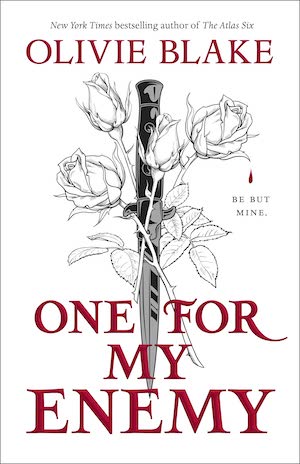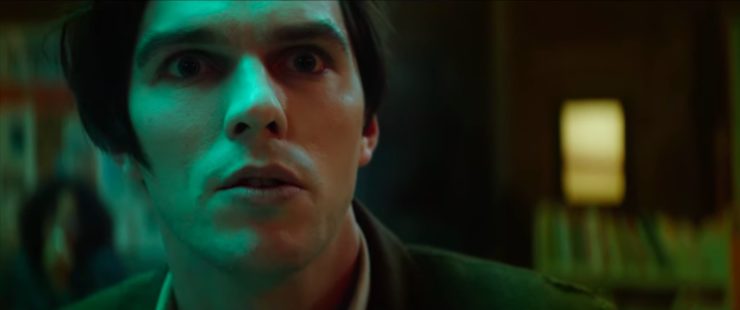When viewers meet Dracula (Nicolas Cage) and his familiar Renfield (Nicholas Hoult), we’re in present-day, crime-ridden New Orleans, and Renfield is in existential crisis. He no longer wants to find victims for his master—even if he was sourcing only people who seemed to be already evil. So Renfield goes to a group-therapy meeting for those dealing with toxic relationships.
For those familiar with Bram Stoker’s novel Dracula, we remember Renfield as the guy in the psychiatric hospital that feels more like a prison, eating spiders, observed by Dr. John Seward. The character Renfield in this film has the same character markings as that Renfield: he eats ants, bugs, and spiders for strength… but he doesn’t have the manic compulsion of counting the power of the various lives he consumes, like he does in the novel. He is, a little more directly, explained as Dracula’s “familiar.” That means he gets a fraction of Dracula’s powers by doing a fraction of the amount of evil that Dracula commits.
The film Renfield adapts this idea the same way that Marvel movies adapt their source material: it cherry-picks a few of the most iconic aspects of the characters, situates those characters in a conflict that is easily relatable to their target audience, and it addresses that plot conflict with superhuman abilities.
Here is where I should probably introduce myself. I’m a real big horror fan. I especially love Gothic horror. And Dracula runs through my veins. Dracula truly won’t die. And despite its xenophobia/racism, I love Dracula, the novel. For that reason, I wasn’t sure I’d love Renfield. I love the source material too much to appreciate its spinoffs. Even Tom Waits’ portrayal of Renfield is, for me, a bit of a stretch. I’m one of those people who seldom enjoys an adaptation of a book that I’m familiar with—I’ll mutter, “That’s not how it happened in the book,” etc. all through the film if I’ve read it recently.
Because of the approach the filmmakers took to Dracula, though, that wasn’t an issue for me at all. It was a brand new plot in a brand new place… with almost brand new characters. As I mentioned, Renfield is relatable. Renfield! Relatable! He’s not crooning “master” to a full moon outside a window with steel bars crosshatching through it—he’s helping Dracula take over the world, one corrupt city at a time, somewhat against his will. At least, Dracula manipulates him into thinking he has no other choice—
When Renfield stumbles upon a group therapy session (while he’s supposed to be out hunting prey for Dracula), he realizes that he’s in a toxic relationship. He’s allowing his boss to have control over him. After attending the meetings regularly, he grows attached to the other participants, and Renfield starts to feed Dracula the toxic people in their lives. It’s a relatable situation… into which they’ve placed a person with superhuman abilities. It’s essentially a superhero movie.
Also, when I say Dracula “manipulates” Renfield, it’s not the alluring and mysterious beast that’s associated with the Gothic telling of this narrative. Dracula plays like a skeezy, manipulative boss or boyfriend who tricks Renfield into thinking he’s not good enough for anyone else to employ or love. It’s a pretty interesting way to update the story.
Buy the Book


One for My Enemy
It does flatten some of the vice that the mythology has, though—we know Dracula is evil. He’s evil in every story, but in some renditions, there’s a gray area that allows the viewer to sympathize with his nocturnal plight. This movie is not that. I won’t say the character is cartoony because it does stop short of that descriptor, but there’s no nuance there. That’s intentional, though, clearly, because Nicolas Cage’s performance is really sound.
So is Nicholas Hoult’s, if I’m being honest. They’re not very round characters, but they’re not supposed to be. This is a simple fight of Pretty Good versus Evil—no one’s really “Good,” and as we know, anti-heroes are all over superhero movies right now.
You won’t find the cerebral tortured genius of the Gothic Dracula here. Renfield is a comedy horror film. There are a few laughs, especially from the group therapy leader Mark (Brandon Scott Jones), like when he asks Renfield “What will happen if you don’t do what he says to do?”
Renfield replies, “He won’t grow to full power.”
Mark is supportive: “Yes! Why would you say it like that!”
Still, Awkwafina’s humor capacity was drastically underutilized. Renfield is more so a “comedy” in the way that means lighthearted rather than actually funny.
The best laughs (aside from Mark’s) come mostly from surprise. Anytime Renfield is in a pinch, he grabs a nearby insect, drops it down his gullet, and powers up Super-Mario style. He plows his way through henchmen after crony, at times parkour-ing up walls, dodging bullets with Matrix-style body-bending, and using weapons of opportunity to clear the way for the police. It’s not meant to be analyzed for its content or commentary. Just enjoy the ride from beat to beat, and laugh with the rest of the audience at the ludicrously executed kills. Because there are a ton of unique kills.
Mary Kay McBrayer is a true crime writer, podcast host, literature professor, and author of America’s First Female Serial Killer: Jane Toppan and the Making of a Monster.











There’s at least one author who did not write Dracula as EVIL. Fred Saberhagen’s Dracula series has a sympathetic version of the character. (And the novel where he points out the plot holes in the original is fun.)
Having read (and thoroughly enjoyed) Mr Stoker’s original novel I can safely say that Count Dracula is not meant to be sympathetic – that fiend feeds a small child to monsters he created in the first place and brought them that treat mostly because he’d gotten sick of their company, was planning to ditch them, and plans to keep them distracted with munchies (and the promise of more) until he’s safely en route to an exciting new life.
We are, it must be said, given some room to pity Dracula for having dealt with The Devil for power, gotten exactly what he asked for* and being cursed to suffer the consequences ever since – but pity is not the same thing as sympathy and I think it’s important to keep that it mind.
R.M. Renfield, on the other hand, is built to be both pitiable and sympathetic – much to my delight the film actually remembers that (along with the fact that Dracula uses people) and treats the character accordingly, even as it hares off on a frolic all it’s own.
This is, in fact, part of the reason I genuinely loved watching it (although claims this film is a direct sequel to the Bela Lugosi DRACULA make less sense than the possibility it shows what might have happened had Count Dracula won out in his clash with Van Helsing et al).
*No, really, it’s in the novel: Count Dracula is explicitly stated to have attended Satan’s very own finishing school and picked up his immense sorcerous powers there (It’s not clear whether or not he was transformed into a vampire there – I believe it’s implied that much of his power derives from sorcery, not vampirism – but there’s at least a strong possibility that this was in fact the case).
Special kudos to Mr Nicolas Cage for making sure we get the best possible version of “Nic Cage IS Count Dracula” in this film: his take on the character is pathetically nasty, gloriously evil and genuinely monstrous by turns (Also, I’m quite delighted by this highly distinctive version of the vampire’s very nasty mouthful of sharp teeth), but due credit to Awkwafina for reminding us that there’s nothing more inimicable to a Dracula than a competent, intelligent and downright heroic woman.
I wanted to see this, but I don’t think I can get past the fact that in his Drac makeup, Nicolas Cage is a dead ringer for Marilyn Manson
Some might call that more of a feature than a bug, but I didn’t spot the resemblance myself (In all honesty he just looked like a Dracula, albeit a fairly rock-and-roll sort of Dracula).
Mr Nicholas Hoult, on the other hand, doesn’t really look like Mr Dwight Frye but somehow managed to fool me into thinking he did – such is the power of Acting and some excellent costume design.
@@.-@: Yes, it’s entirely plausible that the resemblance, whether strong or merely passing, is intentional, given Dracula’s characterization in the movie. In any case, I always found Manson supremely irritating at best, and in the wake of the recent allegations against him, I find him nauseating. I just don’t want to be constantly reminded of that while watching what should be a fun movie.
is anyone else struggling with the premise that superhero movies are about putting someone with powers in a relatable situation?
Iron Man – Billionaire fights over military tech
Captain America – Military turns a regular person into a propaganda symbol and the person fights to be a hero instead
Thor – Deity fights other deities and fairies to determine who is the prettiest princess (ok, maybe this one is relatable).
Avengers – Alien Invasion! Robot Invasion! More Alien Invasion!